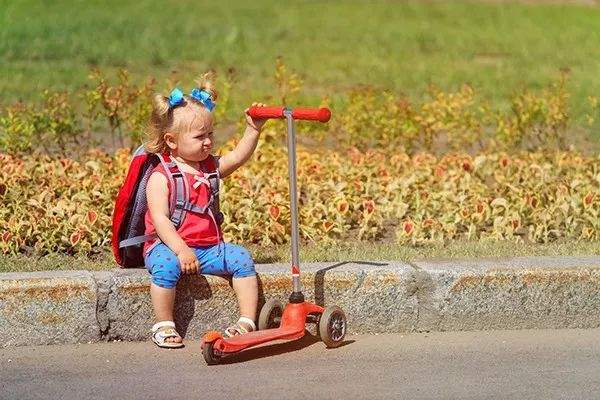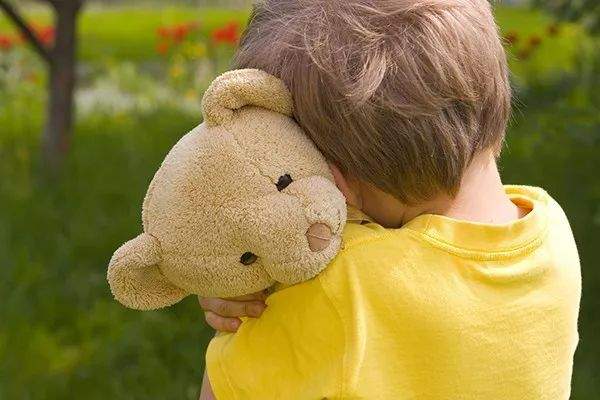Before, we had sent the content of “Do you want to teach your child to fight back when your child is beaten”, which resonated with many parents.
There are many parents asking questions backstage:
Children’s toys are often robbed. What should parents do at this time?
Is it to teach the child [magnanimous and harmonious], or to force the child to snatch it back, or even to help the child himself?
Let’s listen to a mother’s opinion. I hope I can throw bricks to attract jade and arouse everyone’s thinking.
The daughter’s scooter was [robbed]

I took my little daughter to kindergarten. She was riding a beautiful scooter she had just bought.
At the gate of the kindergarten, several girls about the same age as her saw such a beautiful scooter and immediately surrounded them. One of the older children, like Tingting, said in an unquestionable tone:
Let me play with your scooter, we can be good friends.
With that, she pushed the scooter straight away.
Her movements were smooth and natural, and her daughter froze at once.
I looked at my daughter as if the incident had suddenly occurred and she had not yet responded.
After a few seconds, I asked her:
Do you feel like what?
She said:
That’s mine.
After a pause, she added:
I don’t want her to play.
I said:
You can tell her that she can’t play on your scooter without your consent.
The daughter suppressed her mouth and wanted to think, pulling my clothes:
Mom, you help me to say it.
I took my daughter to Tingting. I squatted down and looked up at Tingting:
Hello, you need your sister’s consent to play scooter. This is my sister’s new one. She hasn’t played enough yet.
Tingting [oh] said, as if what I said made her feel very fresh, and then she returned the scooter to her daughter.
The daughter was happy and went to play with several familiar children.
She explained to the children that all her new scooters have what function, and the children eagerly asked:
Can I ride it?
The daughter simply said:
Well, each of us rode a circle (around the yard).
When I left kindergarten, a familiar parent went with me.
She said:
I just saw you deal with the matter of robbing toys. The way is quite good. In fact, I should do the same, but I am afraid others will say that children are stingy and selfish!
I paused and remembered that when my eldest daughter was young, I seemed to feel the same way, but later I knew that it was a very unnecessary worry.
Children are robbed of toys, grievances and crying are normal manifestations. This is not selfish or stingy, but an expression of dissatisfaction with the invasion of self-boundaries.
On the contrary, when other children were robbed of toys, they didn’t care. It seemed that they were sensible and clever, but perhaps their hearts no longer felt pain, because they didn’t realize that their boundaries needed to be respected.
Forcing children to share is a kind of exploitation of children.

Due to face and courtesy, many parents feel that their children should be allowed to share magnanimously.
However, such compulsory sharing is harmful to children.
From birth, the baby did not know that he was different from others and the environment. He felt that he was the center of the universe. Six to 12 months later, he began to understand that he was himself and others were others.
At the age of 2 or so, he can recognize himself from photos or videos, and can also distinguish the difference between [you] and [I]. He initially has self-awareness, and then slowly, he begins to try to better confirm himself through external objects, that is, what kind of existence he should be.
Children need to confirm their [territory] by occupying items.
The clearer a child feels about himself, the safer he will feel and the more conducive he will be to personality growth.

Even if he doesn’t like that thing, it is [his] and others can’t move it casually, let alone rob him of what he likes without his consent.
A friend of mine, when her child was in the third grade, her mother gave her Barbie doll to her aunt’s sister while she was at school. She could not find it when she came back from school, cried and was reprimanded by her mother:
It is better to save some energy and study hard when you are so big and still play with dolls.
Until now, when she is an adult, she still cannot safeguard her normal interests. She is often bullied at work and regrets that she is too timid afterwards.
Some parents like to be nice people, or fear conflicts with others, or worry that their children will become selfish in the future, which is not conducive to the development of interpersonal relationships, thus persuading or even forcing their children to share their toys, food, etc. with other children. This is actually a kind of exploitation.
Children who are often exploited will have a sense of powerlessness and feel that their own things are their own. In the long run, they will reject [good] things and think they are not worthy.
Respect for children’s wishes can cultivate children’s self-esteem.
In addition to toys being robbed, normal education is also very important.

I usually attach great importance to teaching my younger daughter to safeguard her vested interests.
I will start from her feelings and respect her thoughts. If she needs my help, I will show her without any emotion.
Just like the scooter robbery mentioned at the beginning of this article.
I think the specific method of how to educate children on the issue of boundary sense varies from person to person, and all parents cannot follow only one or two common models.
As long as we grasp the principles, such as the following points:
1. Educate children [you may not share, but don’t take things that are not your own]
Children of two or three years old will experience [I] existence by possessing things. I never force my daughter to share to destroy her sense of self-worth. However, I will often tell her what does not belong to her, and excessive possession is not conducive to the establishment of children’s sense of boundary.
2. Teach Children to Learn to Discuss
Consultation is not an order, on the contrary, it is an emotional exchange, and it is very likely that the consultation will not reach an agreement for a long time, so I will tell my daughter [patience is the cutest child].

3. Parents set an example for themselves,
At ordinary times, I have prepared two drawers for my daughter at home. She thinks that everything important will be put into the smoke. I never move. When I was cleaning, I would ask her [do you want this thing or not]; I will greet her in advance when I borrow her belongings, such as adhesive tape.
4. Be responsible for taking other people’s things
Sometimes my daughter will take back some pencil sharpeners and picture books from the kindergarten. When I am sure that she did not exchange but took the children’s belongings without permission, I will take her back to the children and ask her to apologize.
[Also] and [Apologize] are to let her take responsibility for her actions.
Someone once asked me:
The child’s things were robbed, shouldn’t he go and get them back? Is it not good for adults to intervene?
Only when parents maintain the border for their children can they understand [I cannot be invaded casually].
It is almost an unchangeable truth that how those [important people] in a child’s life treat the child and that the child will treat others in the same way in the future.
What we need to face is not only [whether the toy is robbed or not].
It is to teach children to respect other people’s borders and to guard their own borders.
Janet Lansbury, an expert on children’s education, has a very vivid metaphor in his book “Boundaries, Only Freedom”:
Children’s need for borders is like driving across a bridge in the dark-
If there are no railings on both sides of the bridge, they can only pass slowly and tentatively. But if there are railings on both sides, they can easily and confidently drive through.
Helping children establish an appropriate sense of self-boundary is one of the best gifts we can give children in the process of growing up.
